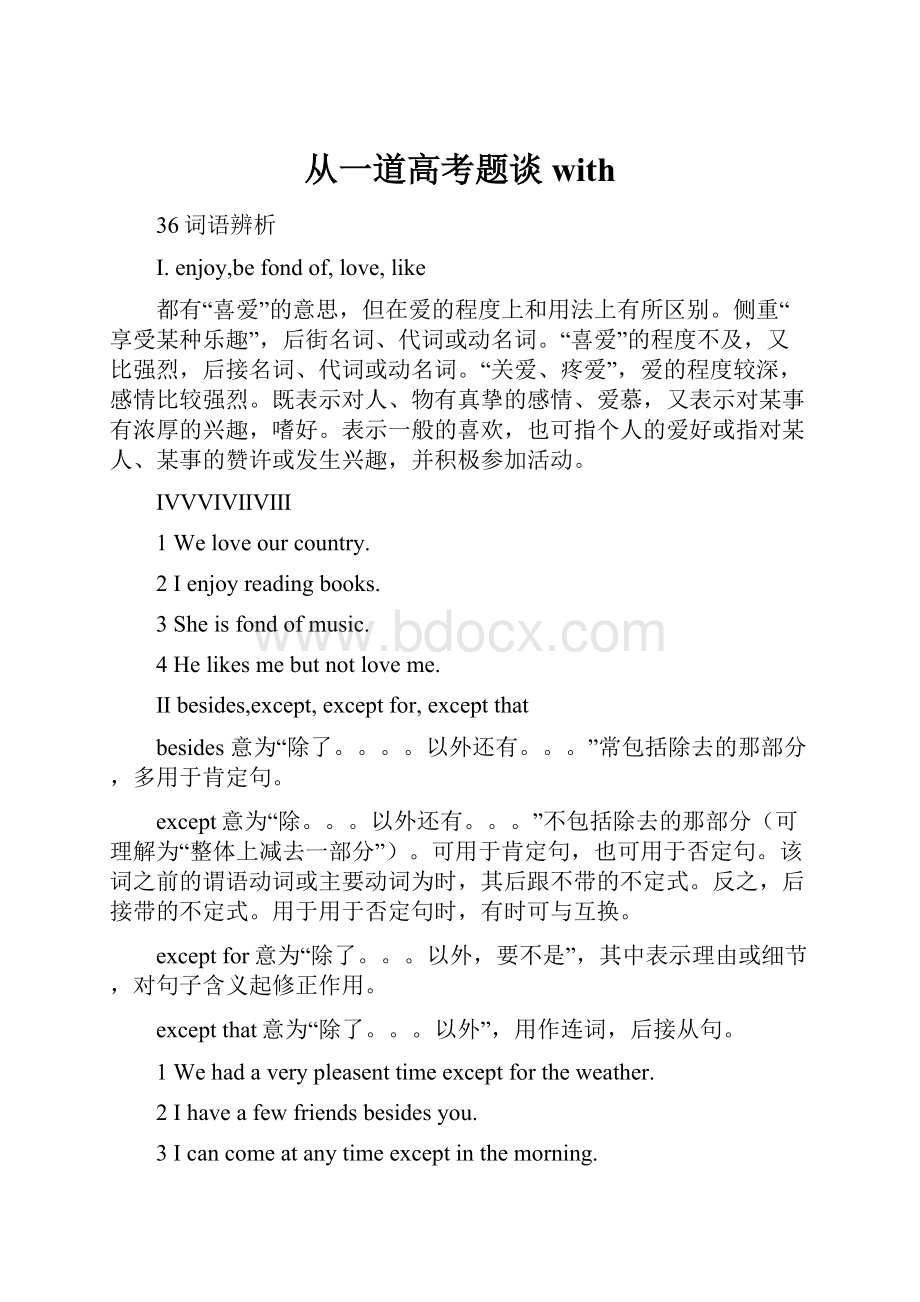从一道高考题谈with.docx
《从一道高考题谈with.docx》由会员分享,可在线阅读,更多相关《从一道高考题谈with.docx(22页珍藏版)》请在冰豆网上搜索。

从一道高考题谈with
36词语辨析
Ⅰ.enjoy,befondof,love,like
都有“喜爱”的意思,但在爱的程度上和用法上有所区别。
侧重“享受某种乐趣”,后街名词、代词或动名词。
“喜爱”的程度不及,又比强烈,后接名词、代词或动名词。
“关爱、疼爱”,爱的程度较深,感情比较强烈。
既表示对人、物有真挚的感情、爱慕,又表示对某事有浓厚的兴趣,嗜好。
表示一般的喜欢,也可指个人的爱好或指对某人、某事的赞许或发生兴趣,并积极参加活动。
ⅣⅤⅥⅦⅧ
1Weloveourcountry.
2Ienjoyreadingbooks.
3Sheisfondofmusic.
4Helikesmebutnotloveme.
Ⅱbesides,except,exceptfor,exceptthat
besides意为“除了。
。
。
。
以外还有。
。
。
”常包括除去的那部分,多用于肯定句。
except意为“除。
。
。
以外还有。
。
。
”不包括除去的那部分(可理解为“整体上减去一部分”)。
可用于肯定句,也可用于否定句。
该词之前的谓语动词或主要动词为时,其后跟不带的不定式。
反之,后接带的不定式。
用于用于否定句时,有时可与互换。
exceptfor意为“除了。
。
。
以外,要不是”,其中表示理由或细节,对句子含义起修正作用。
exceptthat意为“除了。
。
。
以外”,用作连词,后接从句。
1Wehadaverypleasenttimeexceptfortheweather.
2Ihaveafewfriendsbesidesyou.
3Icancomeatanytimeexceptinthemorning.
4Iknownothingabouthimexceptthathelivesdownstaires.
Ⅲworth,worthy
worth为表语形容词,意思是“值得”,后接名词、动名词(主动式);可与while连用。
如Itisworthwhiledoingsomething.或Itisworthwhiletodosomething.
worthy能用来作定语;也可作表语,这时与搭配可接动名词,也可单独使用,接不定式,但动名词和不定式一般须用被动形式。
1Theproblemisworthyofdiscussion.
2HetoldTom’smotherthatTomwasnotworthteaching.
3Thefilmisworthytobeseen.
4Thebookisworth3dollars.
because,why
Ⅰ.仔细辨认下列句子,并用适当的词填空。
1)Itwasalongwayandwewantedtocomebackonthesameday.That’s__westartedsoearly.
2)Youhavefailedagainthistime.That’s___youareproud.
3)Tomisill.That’s____hehasn’tcometoday.
4)Tomisill.Thatwas____heworetoolittleyesterday.
解析与答案:
1)why2)because3)why4)because
这两个词都可用作连词,引导表语从句,意思为“因为,是……的原因”。
但当表示前面已经说明了理由,用why.而前面所说的情况的发生或存在正是后面的原因造成时,用because。
notalittle,notabit
Ⅱ.仔细辨认下列句子,并用适当的词填空。
1)Areyoutiredaftersolongawalk?
Yes,____.
2)Althoughheworkedsolong,hewas____.
3)Ithascausedme____anxiety.
4)Heis____better.
解析与答案:
1)notalittle2)notabit3)notalittle4)notabit
notabit意思为“毫不,一点也不”。
notalittle是“相当,非常”的意思。
More,another
Ⅲ.仔细辨认下列句子,并用适当的词填空。
1.-----Haveyougotenoughchairshere?
-----No,weneedtwo____
2.Sgewaitedforhimfor___twoweeks
3.Iwantsome____tea.
4.Pleasedrinl____glassofmilk.
解析与答案:
1.more2.another3.more4.another
这两个词都可用来表示“额外的数量,另外一些”。
More常置于数词后,其后可接可数名词,或不可数名词。
其前面也可用some,few,any,many,much,little等词修饰;another用在数词前,其后接可数名词。
例如:
I’llbehereforanotherweeks.I’llbehereforthreemoreweeks.我还要在这里待三个星期。
near,close
Ⅳ.仔细辨认下列句子,并用适当的词填空。
1.Theschoolis___tomyhouse.
2.Thepostofficeisquite____.
3.Children’sDayisquite____.
4.Heisoneofmy____friends.
解析与答案:
1.close/near2.near3.near4.close
当表示空间或时间上的“接近”时两词意思几乎一样,但near在程度上比close弱;而close有接近和尽在身旁的意思。
by,through
Ⅰ.仔细辨认下列句子,并用适当的词填空。
1.Wegotthenews____ourfriend.
2.Whatdoyoumean____that?
3.Youstartthecar____turningthekey.
4.Look____thewindowandyoucanseewhatishappeninginthestreet.
解析与答案:
1.through2.by3.by4.through
这两个词都可以表示“通过”。
through(指方法、手段等)经由,以……,(时间、空间)穿过、通过;by(表示方式、方法、手段等,后接无冠词的名词、代词或动名词)“通过,靠,用,根据,依据,按照”。
onthefire,onfire
Ⅱ.仔细辨认下列句子,并用适当的词填空。
1.Thehouseis____Pleasecallthefirefighters.
2.Lookout!
Thepanis____.
3.Don’tputyourclothes____.It’sdangerous.
4.Intheancienttime,peopleusedtocookwholeanimals____.
解析与答案:
1.onfire2.onfire3.onthefire4.onthefire
onfire意思为起火,失火,fire为不可数名词,类似短语有playwithfire玩火,setfireto放火,焚烧,纵火。
Take/catchfire着火,开始燃烧。
Onthefire意思为在炉火上,fire为可数名词,与它搭配的短语还有makeafire生火。
once,ever
Ⅲ.仔细辨认下列句子,并用适当的词填空。
1.Haveyou____madedumplings?
2.I____livedinBeijing.
3.Theywere____goodfriends.
4.Itisrainingharderthan____
解析与答案:
1.ever2.once3.once4.ever
once和ever都有“曾经”的意思。
ever用于一般现在时,一般过去式和现在完成时。
用于否定句,条件状语从句,比较状语从句时,意思为“在任何时候”Nothingneweverhappensinthislittletown.这个小镇至今不曾发生过新鲜事。
Ifyouevercomehere,besuretoletmeknow你若来到这儿,务请通知我一声。
用于形容词、副词最高级和比较句型as…as起加强语气作用。
once
仅用于过去时的肯定句中。
sofaras,asfaras,sofar
Ⅳ.仔细辨认下列句子,并用适当的词填空。
1.Hewalked____thepostoffice.
2.Wedidn’tgo____theothersdid.
3.____theworkhasbeeneasy.
4.____Iknow,hewillbeawayforthreemonths.
5.解析与答案:
1.Asfaras2.sofaras3.Sofar4.Asfaras
sofaras就而论,就范围内程度内,asfaras和一样远,在否定句中常用,至某一指明的地点,sofar迄今为止,常和现在完成时连用。
alive,living,live
Ⅰ.仔细辨认下列句子,并用适当的词填空。
1.Theyarethehappiestchildren____.
2.Heisdead,buthisdogisstill____.
3.Haveyouseena____whale?
4.Isyourgrandfatherstill____?
解析与答案:
1.alive2.alive/living3.live4.living
这三个词都有“活着的”意思。
alive常作表语,作定语时置于被修饰词之后,指人或动植物。
Living常作表语和前置定语,更强调“健在,尚在人间”。
Theliving用作复数名词,指“活着的人们”。
Live做前置定语,常用来修饰物而不修饰人。
onedaysomedaytheotherday
Ⅱ.仔细辨认下列句子,并用适当的词填空。
1._____lastweekIbethim.
2.Isawyourfriend____.
3.Iwilltakeyouthere____.
4.____youwillrealizeyourmistakes.
解析与答案:
1.Oneday2.theotherday3.oneday/someday4.someday/oneday
oneday和someday都可以表示将来的某一天,但前者也可以表示过去的“某一天”,而后者不可。
theotherday意思为“前几天”。
,只用于过去时。
greatly,very,much
Ⅲ.仔细辨认下列句子,并用适当的词填空。
1.Sincethenthenumberofmiludeertherehas____increased.
2.Ithinkheis____old.
3.Heis____toobusy.
4.Nowitis_____easiertomakeplansforourtrips.
解析与答案:
1.greatly2.very3.much4.much
这三个词均可表达“非常”之意,其主要区别在于:
用来修饰动词和过去分词,意思为“大大地”。
very用来修饰原级形容词、副词。
much用法同greatly,有时可互换,不如greatly语气强,还可以放在too及形容词和副词比较级前。
callon,dropinpayavisit
Ⅳ.仔细辨认下列句子,并用适当的词填空。
1.I____tohimlastweek.
2.I’ll____himathishouselater.
3.Shallwe____yourbrother___thisafternoon?
4.They____onmeyesterday.
解析与答案:
1.paidavisit2.callon3.payavisit4.droppedin
有关“拜访,访问”的短语,callon只限于后面接人,其后接地点时用callat。
Dropin是不及物词组,特指顺路探访,多用于口语,后面接人时用dropinonsb,后接地点时用dropinat。
而paysbavisit或payavisitto+人物、地点
with,under
16仔细辨认下列句子,并用适当的词填空。
1.____thehelpofourteacher,erhavemaderapidprogressinEnglish.
2.Hewenthome____mypermission.
3.____thedirectionofhismother,Tomwroteanexcellentarticle.
4.Wehavewononevictoryafteranother____theParty’sleadership.
解析与答案:
1.With2.with3.Under4.under
这两个介词都可表示“在…下”,under意思为“在……领导下,管辖之下,指导之下”。
withsb’shelp/permission意为“在……的帮助下、允许下”。
affair,business,matter,thing,event
17仔细辨认下列句子,并用适当的词填空。
1.Whatwerethechief____oflastyear?
2.____aregettingworseandworse.
3.Thereareseveral____tobedealtwithatthemeeting.
4.Mindyour____.
5.Aprimeministeriskeptbusywith____ofstate.
解析与答案:
1.events2.Things3.matters4.business5.affairs
affair可指已发生的或必须去做的事件,多为泛指。
可以指小事personalaffairs,也可以指大事foreignaffairs,nationalaffairs。
business常用来指一种任务、责任或职责要求去做的事物。
不可数名词。
固定搭配有:
onbusiness因公,businessman生意人,Businessisbusiness。
公事公办。
matter常指应给与注意、考虑或需要处理的事情、问题、毛病或困难。
event多指重大、重要事件,还可指运动项目。
thing常用来指具体的物、东西,用复数形式表示“情况、事态”,还可指人。
cost,spend,takepay
18仔细辨认下列句子,并用适当的词填空。
1.It____mehalfanhourtogotoschool.
2.She____theafternoonincleaningthewindowsandfloors.
3.She____alotofmoneyonclothes.
4.Itwill____you$500toflytoBeijing.
5.Myuncle____$50forthenewcolorTVset.
解析与答案:
1.takes2.spent3.spends4.cost5.Paid
Cost主要指话费金钱、时间、劳力、精力等。
不可用表示人的词作主语,可带双宾语,spend是指把时间、精力、财力等花费在某事或某事物上。
主语是人,常用短语:
spend…onsth.Spend…indoingsth.Take多指花费时间、劳力。
主语一般为名词或动名词短语,常用it作形式主语,不定式短语作真正主语。
构成句型:
某事花费(某人)……时间。
pay是指为买到或得到的东西付钱。
主语是人,常和介词for连用。
wear,puton,haveon,dress
19仔细辨认下列句子,并用适当的词填空。
1.He____hisglassesandrushedout.
2.Sheis____anovercoattoday.
3.He___abluejacket____.
4.Theboyistooyongto____himself.
解析与答案:
1.puton2.weraring3.had;on4.dress
wear强调“穿着、戴着”的状态。
puton强调“穿上、戴上”的动作。
haveon同wear,但不用于进行时态。
dress既表示动作,又表示状态,dresssb.in(动作),bedressedin(状态),还可用作不及物动词,如:
theydressedwell(状态)。
payback,payfor,payoff
仔细辨认下列句子,并用适当的词填空。
1.HowcanI____you____forallyourkindness?
2.Ihavealready____thecar.
3.I____him____the$10helentme.
4.Aftertenyearshe____hisdebts.
解析与答案:
1.pay;back2.paidfor3.paid;back4.paidoff
payback意为“偿付(借款等)”,报答;向……报复,payfor指花钱买……,负担……的费用,payoff是指还清债务
above,over
“在……上方”怎么表示?
仔细辨认下列句子,并用适当的词填空。
1.Theskyis____ourheads.
2.Thereisabridge____theriver.
3.Wewereflying____theclouds.
4.Mybedroomisjiust____.
解析与答案:
1.over/above2.overr3.over4.above
above指可能垂直在上,也可能不在垂直之上,表示上下位置高度,两物体表面不接触,与below相对。
Over表示垂直地在……上方,两物不接触,与under相对。
Lie,lay
仔细辨认下列句子,并用适当的词填空。
1.He____abookonthetable.
2.Dobeanhonestboy.Don’ttella____.
3.Theboy____there____thathishen____twoeggseachday.
4.Ontheground____awoundedsoldier.
解析与答案:
1.laid2.lie3.lying;lied;laid4.lay
Lie的意思为“躺,位于”,是不及物东西,其动词原形、现在分词、过去式和过去分词的变化形式如下:
lie—lying----lay---lain;当表示“说谎”时,lie可用作可数名词,作动词时,其变化形式如下:
lie----lying----lied----lied而lay的意思是“搁、放置,产卵”,属于及物动词,其变化形式如下:
lay---laying---laid---laid
Almost,nearly
仔细辨认下列句子,并用适当的词填空。
1.Sheslippedand____fell.
2.Thestudentsinourclassare____allboys.
3.Thereisnot____enoughmoneyforanewhouse.
4.That’s____toomuch.
解析与答案:
1.almost/nearly2.almost/nearly3.nearly4.almost
这两个词都有“几乎,差不多”之意。
其区别如下:
①almost在all,every,always或否定动词前,与动词、形容词、副词等连用时可与nearly通用。
②Almost可后接表示否定意义的词,如any,no,none,never,nothing,而nearly不可。
③Nearly前可被not修饰,即notnearly,意为“远非,完全不”。
而almost不可如此。
④Nearly在very,pretty,not后,常跟数词、形容词、副词连用。
⑤Almost可与morethan,too连用,而nearly不可。
Job,work
仔细辨认下列句子,并用适当的词填空。
1.My____isteachingEnglish.
2.Ihavealotof____todotoday.
3.Hahasa____asateacher.
4.Heisat____now,buthe’llbebacksoon.
5.解析与答案:
1.job/work2.work3.job4.work
这两个词指职业性工作时,区别不大。
其区别如下:
job是可数名词,指已做、要做或应做的某种具体工作。
Work为不可数名词,常指抽象意义上的工作。
move,remove
仔细辨认下列句子,并用适当的词填空。
1.____thelidandthekettleisboiling.
2.Icanhearsomebody____aboutupstairs.
3.She____thedishesfromthetable.
4.Don’t____aboutwhileI’mtryingtotakeyourphotograph.
解析与答案:
1.Remove2.moving3.removed4.move
可